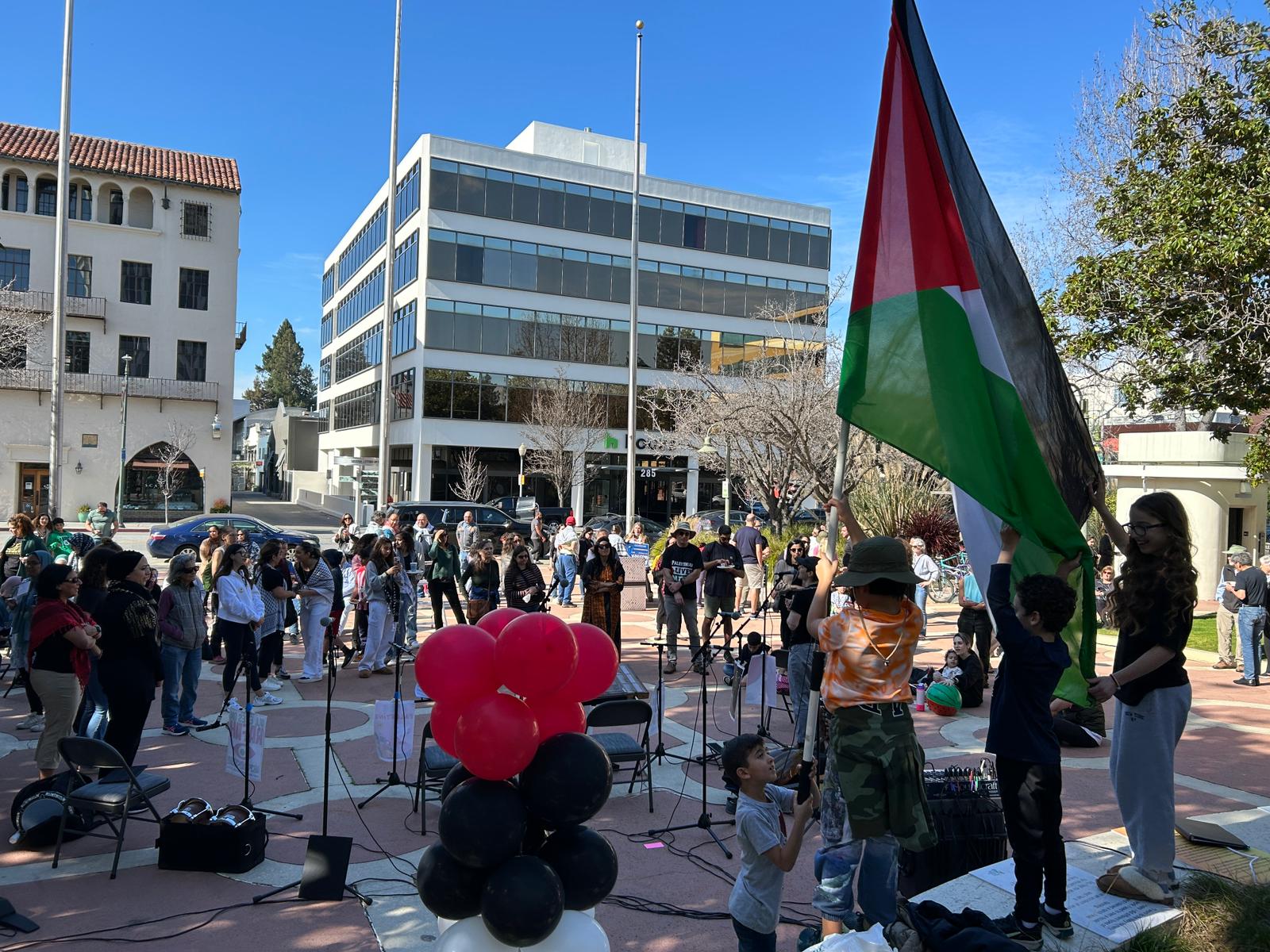[embedyt] https://www.youtube.com/watch?v=DiN80g0EepE[/embedyt]
Listen to this note:
With music, food and children's activities, a large group of residents of Palo Alto, California, joined the growing number of voices against the genocide that Israel is committing against the Palestinian people.
The rally took place at King Plaza, 250 Hamilton Ave., where a vigil in solidarity with Palestine was held, organized by ASWAT and Heal Palestine.
Among the organizations present, he highlighted ZawayaZawaya, a nonprofit organization that promotes multicultural discourse in the Bay Area through Arab arts. Founded in 2003 by Nabila Mango and Haya Shawwa Ben-Halim, Zawaya seeks to provide a space to discover and enjoy the multiple art forms in Arab culture.
Bisan Shehadeh, Executive Director of Zawaya, stressed the importance of solidarity with Palestine, highlighting the crucial role of the community in speaking out against the injustices it faces.
Shehadeh told Peninsula 360 Press in an interview that, “Palestine is in our hearts and minds. Although our organization is not only for Palestinians, I am an indigenous Palestinian. My mother, the founder of Zawaya is an indigenous Palestinian. The community has asked us to perform music from Palestine here at the vigil.”
The vigil creates a community space for Palestinians to raise their voices against the atrocities and brutalities they have been experiencing recently.

For decades, Palestine has faced the occupation of its lands, the expansion of illegal settlements and the economic, social and military blockade imposed by Israel. This situation has worsened over time, resulting in a conflict that has claimed countless innocent lives, especially in the besieged Gaza Strip.
Indiscriminate attacks, destruction of basic infrastructure and the constant displacement of Palestinian families are ominous aspects of the Zionist siege against Palestinians who are calling for a just and lasting solution. The occupation of Palestine has been going on for Bisan Shehadeh's entire life.
Shehadeh said: 'My parents are exiles from their villages who had to evacuate when the Zionist militia came in. They were dispossessed of their homes at a very young age.'
The genocide in Gaza resonates deeply in communities like the Bay Area in the United States, reminding us of the urgency of international solidarity and commitment to global justice.
“It is very important for Americans to speak out against the genocide taking place in Gaza. They can participate in vigils like this one, or they can talk to their local representatives, call for a ceasefire. The most important message is that being anti-Zionist is not being anti-Jewish,” Shehadeh said.
Michelle Higgins, one of the residents who organised the vigil, expressed her commitment to the Palestinian cause and lamented the lack of response from local authorities to the ceasefire resolution.
Higgins urged the community not to remain indifferent to the suffering of the Palestinian people, recalling the shared responsibility to demand justice and end the violence.
“The Palestinian community feels this very deeply, and so does the Muslim community. I’m not Palestinian or Muslim, but you can’t look at those images and not feel like you have to do something. Especially when you know that our government is funding this war in Gaza. It’s really important for other people to know that people in this community really care about what’s going on.”
On the involvement of the Latino community in the protests against the genocide in Gaza, Higgins added: “Our movement is very multiracial and multicultural and I think there are a lot of commonalities between the communities about the experiences they have had in their countries of origin. As a group, we are of all ages and backgrounds.”
It is crucial to recognize that criticism of genocide should not be equated or confused with anti-Semitism; to do so is to simplify and distort the true reasons for condemning violence and injustice.
Higgins believes that “it is ironic that speaking out against genocide can be labelled anti-Semitic. We speak out for human life, human dignity and justice.”
Domenica, 25, originally from Ecuador and a participant in the vigil, shared her feeling of helplessness in the face of the tragedy in Palestine, but also her hope for change through collective action.
“As a young person, I feel powerless, unable to help, seeing so many children and adults die every day. I think coming here makes me feel a little more confident in changing what is happening. Don’t be afraid to speak up. Even though we are Latinos and many of us have no connection to Palestine, we must speak up to change the world.”
In a Bay Area context marked by cultural diversity and international solidarity, the Palo Alto community reaffirmed its commitment to justice and human dignity, raising its voice against the Palestinian genocide and advocating for a future of peace and reconciliation in the region.
You may be interested in: US maintains its position and vetoes resolution for an immediate ceasefire in Gaza for the third time

